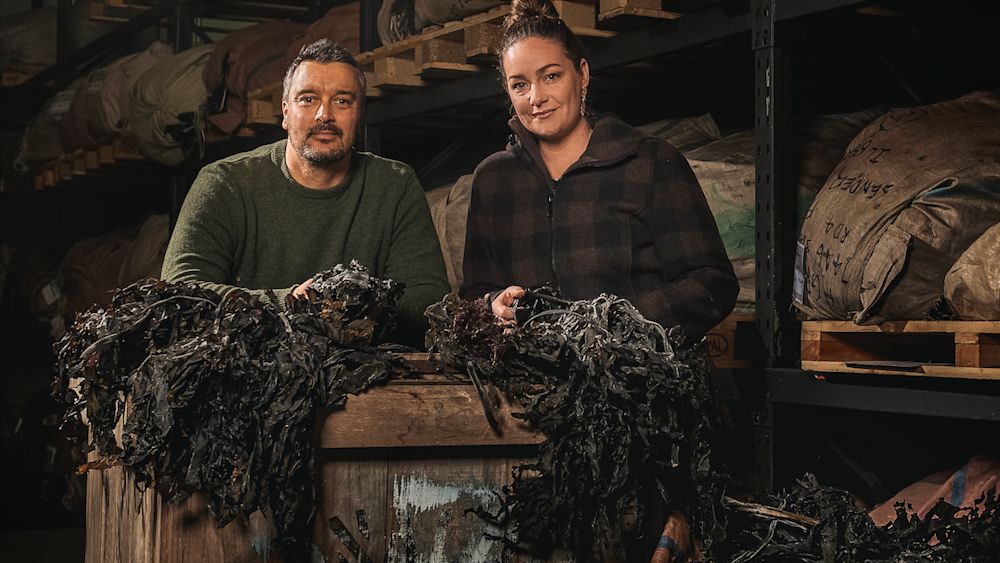- Iterate
- Meet The Team
- Can Seaweed Save the Planet? Meet the Indigenous-Led New Zealand Biotech Company Aiming to Do Just That
Can Seaweed Save the Planet? Meet the Indigenous-Led New Zealand Biotech Company Aiming to Do Just That
Table of contents
Through partnerships with local indigenous groups, family-owned biotech enterprise AgriSea aims to boost sustainable farming – in New Zealand and abroad.

With 10% annual growth, New Zealand’s tech sector is growing faster than any other domestic industry — and many startups are stepping onto the global stage. It’s not just white guys in muted offices, either. Many indigenous-led tech companies are solving global problems and shaping the future of New Zealand’s economy.
Among the most promising is Auckland-based biotech company AgriSea, which recently won New Zealand’s most coveted tech accolade, the NZ Hi-Tech Award as Māori (the term for New Zealand indigenous) company of the year.
AgriSea harvests seaweed – a plentiful natural resource lining New Zealand’s expansive coastlines – then cleverly formulates “biostimulants” to help local and international farmers practice sustainable farming.
Globally, the biostimulants market was valued at $2.85 billion (USD) in 2021 and is projected to grow from $3.14 billion in 2022 to $6.69 billion by 2029. Since its founding in 1998, AgriSea has managed to capture a major slice of this burgeoning market: it employs over 50 staff, continuing to grow offshore, reportedly doubling its export orders compared with the same quarter of the previous year. Although AgriSea is a family-run business with no current outside investors, Bradley said, the company plans to open up to investment as the industry matures.
The applications of these biostimulants extend from soil, pasture and animal health, to cleaning waterways, as well as wound care and cosmetics for humans. The company has even won an award for proto-typing a formulation that reduces the stress of cows and can help stave off diseases in animals and insects, including honey-producing bees.
“AgriSea has always been first and foremost about health and wellbeing, providing nutritional products that support our primary industries both here in New Zealand and overseas,” Chief Innovation Officer Tane Bradley told The Org.
25 years of seaweed
As AgriSea celebrates its win at the NZ Hi-Tech awards, it has simultaneously marked a quarter of a century, evolving from a local startup into a global enterprise. Today, it exports to offshore markets, and it even partnered with Los Angeles-based beekeeping company Pierco.
“It’s been a journey, that’s for sure. We now have friends”, laughed Bradley, referring to its many connections across the seaweed sector, governance, research agencies and environmentalists.
The company is an intergenerational family-run business, pioneered by Bradley’s wife, Clare (CEO of AgriSea), mother Jill Bradley and stepfather Keith Atwood, who laid the foundation of seaweed to improve the health of land and animals.
Though the company has a rich heritage, it remains laser-focused on the future. AgriSea recently secured a $1.5 million innovation fund grant from the New Zealand government to build the world’s first commercial seaweed-based nano cellulose manufacturing plant, enabling AgriSea to scale up, diversify and produce commercial volumes of nanocellulose hydrogel using leftovers from the manufacture of its agricultural and horticultural products.
Of the company’s journey, Bradley said: “We have always had a strong focus on R&D but once Clare and I took over, we set out to strengthen and widen this. We now work with some of New Zealand’s leading research agencies to better understand the value that seaweed can bring.”
AgriSea also has a research collaboration with New Zealand’s National Science Challenge funding allocated to the Revitalise te Taiao land-use sustainability program, which has seen a local Paeroa-based project, led by AgriSea, allocated $2.7 million to test farming methods that aim to enhance the health and strength of the soil across 10 farms.
AgriSea’s future projects
AgriSea’s Paeroa-based Rere ki Uta, Rere ki Tai project - which roughly translates to “bringing together indigenous knowledge and regenerative agriculture” - secured $2.7 million from the National Science Challenge to fund research into whether farming methods can enhance soil to be more resilient, more profitable and healthier for all.
The collection and regeneration of seaweed – an essential resource for the birds and insects that live along New Zealand’s coastlines – is also a key function of the business. Bradley pointed to its close relationship with the Seaweed Association of New Zealand (SANZ) - of which his mother Jill was a founding member.
“In recent times, there have been some great advancements in the aquaculture opportunities around farming seaweed,” Bradley explained. These opportunities pull together "industry and interested parties to … work together and take care of our resources, while also providing business opportunities and job creation.”
Bradley said AgriSea’s continued partnership across iwi (tribes), hapū (subtribes) and remote coastal whanau (family) will “help us grow the seaweed aquaculture sector in Aotearoa in a way that is in line with community impact.”
The company already has 25 years of growth and success under its belt. So, what is the long-term vision for AgriSea?
“We see ourselves as a small but mighty company, always trying to punch above our weight when it comes to impact,” said Bradley. “We are setting on solving some big issues for our future generation such as climate change, plastic pollution, and soil and water degradation with the use of indigenous and science knowledge intertwined.”
Get in front of millions of visitors and job seekers.
- Showcase your company culture to a vast community of professionals
- Host your team on a free org chart to keep employees aligned
- Post jobs on our free job platform for high growth startups
In this article


The ORG helps
you hire great
candidates
Free to use – try today